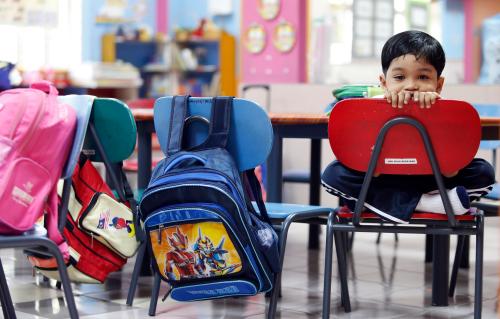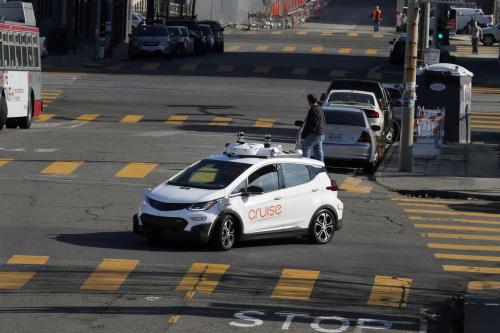The coronavirus mercifully spares most young children. But large disparities in their health and growth will persist–until the political leaders and local activists devise sound and equitable remedies.
It’s taken a global pandemic to reveal how America’s muscular economy depends on pint-size preschoolers. Growing clutches of them begin returning to pre-K centers this month, the smell of alcohol wipes and disinfectants hanging in the air. Parents exhale cautious relief, with some getting to go back to their (paid) jobs, while their kids wonder why hugging teachers is out.
On the policy front, Sen. Patty Murray (D-Wash.) leads the charge to add $50 billion in child-care support for families to Congress’s final economic relief package before elections. Otherwise, how will America’s parents get back to work? Additionally, a fresh plan from presumptive Democratic nominee Joe Biden aims to “to ease the financial burden of care that families are carrying,” proposing that no household pays more than 7% of their income for child care or preschool.
Yet, COVID-19 has already taken its toll on children from lower-income families, many raised by Black or Latino parents and (caregiving) grandmothers hit hard by the virus. These preschoolers–after missing months of quality pre-K–suffer from poor nutrition, rising obesity rates, and untold hours staring into television screens and digital devices. Children typically lose a month’s worth of academic skills over the summer, now further eroded by the absence of preschool.
The immediate challenge is to safely reopen child care and schools. These first steps might prioritize children at risk of irreparable setbacks in their early cognitive growth, preliteracy skills, and broader social development. Are we already forgetting the millions of people who took to the streets, protesting racial inequities that permeate institutions from police departments to public schools?
Take New York City, where Mayor Bill de Blasio recently cleared over a thousand nonprofit pre-K centers to resume operations this month “with daily health screenings … and limited sharing of toys.” The mayor said that “folks need to get back to work, and the only way they can do it is with child care.” Another thousand pre-K programs, situated in city schools, are due to reopen in August.
But de Blasio is kick-starting a vast network of preschools that now tilts toward better-off neighborhoods. My research team recently discovered how pre-K quality ranges higher on average in economically better-off communities, relative to poor areas. It’s a vivid case of how family entitlements can drift toward regressive results, unintended by policy designers.
A half-century of empirical work backs de Blasio’s keen focus on pre-K when it comes to giving poor children a hefty head start. We know that preliteracy levels of poor children–signaled by rich oral language and the ability to recognize letters and rhyming words–fall about one-fifth (a standard deviation) behind middle-class peers even before entering kindergarten. One-third of this gap can be erased by attending a high-quality preschool, such as local programs found in diverse settings from Boston to San Francisco to Tulsa. In New York, de Blasio has remarkably tripled the count of free preschool places since 2014, making the city more affordable for young families, not to mention pleasing colleagues within the Democratic Party who favor greater entitlement spending.
But such well-intended entitlements–promising to narrow inequality–can soon bend toward more affluent families. We found that just one in four children win access to a pre-K that displays a “good” or “excellent” quality rating in programs hosting mostly Black children, while those serving Asian-heritage or white families deliver high quality for two in five youngsters.
Preschools nestled in comfortable areas, such as Brooklyn’s Park Slope community or the Upper East Side of Manhattan, average 12 percentile points higher on several measures of quality, when observed by city monitors, including warm social relations and a rich balance between guided play and structured learning tasks. De Blasio’s pre-K effort is beginning to resemble city schools: distributing quality regressively to racially segregated classrooms.
These institutional disparities can be remedied. “We are shifting our program supports to recognize the collective and individual trauma experienced by the early childhood community as a result of COVID-19,” a senior city official said, responding “to the disproportionate impact this has had on communities of color.” How the city redistributes quality teachers or classroom resources in the rush to reopen remains to be seen.
California Gov. Gavin Newsom continues to embrace a similar entitlement–paid family leave–even protecting his lengthening to eight weeks after a newborn’s arrival, despite draconian state budget cuts last month. His effort buoys the health of infants and mothers alike, and guards against even worse joblessness by encouraging job sharing.
But guess who makes-up the fast-growing set of beneficiaries? Upper middle-class fathers who can top-up their partner’s own weeks of paid leave. These men appear to enjoy better information about paid leave, even corporate HR staff who help them apply for benefits. Small businesses, paying workers less and now under economic stress, may be less enthused about leave provisions.
All entitlements are not created equal. Social insurance, like jobless aid or universal health coverage, socializes the cost of human perils beyond the individual’s control. Under this social contract, you aid the jobless or sick, knowing their tax dollars may one day return the favor. But entitling access to a standard institution–library, parks, or preschool–does not guarantee fairly distributed quality, nor equal results for children or families.
A growing count of policy leaders are first lifting children harmed by COVID-19, building from what some call targeted universalism, policy that aspires for widespread access, while focusing first on poor families. Colorado Gov. Jared Polis is pushing to provide free pre-K to all children, winning legislative approval last month on a measure going before voters in November. This new program, financed by tax hikes on nicotine and vaping, would more than double state preschool spending.
Polis’s initiative awards supplemental dollars to pre-K centers for each disadvantaged child served. The state’s “equity-driven early childhood community” nudged the governor to “do something for everyone, but do the most for children who would benefit the most,” said Bill Jaeger, vice president of the Colorado Children’s Campaign. This policy strategy matches the empirical research: Poor children reap stronger developmental rewards from quality pre-K, compared with middle-class or affluent peers.
Newsom and California lawmakers similarly focus pre-K dollars on narrowing early disparities in young children’s health and learning. “Universal access is the North Star,” Assemblymember Kevin McCarty told me. “But with limited resources it’s smart to start with the kids who need it the most.” McCarty and the legislature’s women’s caucus have protected early childhood programs from budget cuts. “We know early childhood education matters. It’s more important now during COVID-19, helping parents and especially women get back to work.”
Preschool directors in Oakland, California, may first invite back children with special-education needs, then kids with limited English proficiency. This model also first aids youngsters set further behind by the pandemic, while helping blue-collar parents who must return to work and don’t have the luxury of working from home.
As child-care and pre-K options cautiously reopen, let’s learn in this moment how to implement entitlements that not only trumpet inspiring rhetoric, but more importantly ensure fair results for children.
In the long term, the next Congress and perhaps a new president will face stiff pressures to expand family entitlements. If leading Democrats are serious about racial and economic justice, they must get entitlements right–not just promise to close gross disparities among America’s young children, but to make discernible progress toward this worthy goal.
Bruce Fuller, professor of education and public policy at Berkeley, is author of “Standardized Childhood” and “Organizing Locally.” Kaitlyn Du and Talia Leibovitz contributed research for this essay.






Commentary
Are we reopening preschools fairly? Prioritizing children most impacted by coronavirus
July 22, 2020